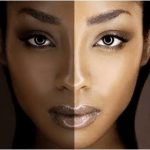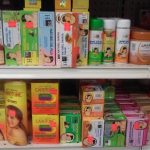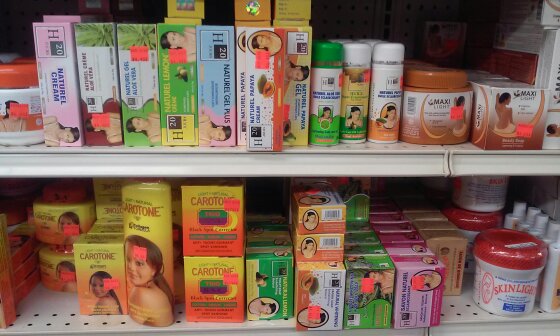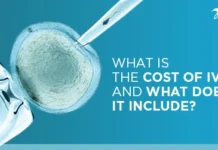African countries that have banned skin bleaching products
What is the list of African countries that have outlawed skin bleaching products?
Skin bleaching is a multibillion-dollar global industry, and at least four out of every 10 women in Africa bleach their skin, according to the World Health Organisation.
According to PubMed, 75% of Nigerianwomen and between 52% and 67% ofSenegalesewomen use skin lightening products. A survey conducted in South Africa’s administrative capital Pretoria showed that 35% ofwomenuse them.
According to a research conducted in Tanzania in 2011, there were six “thematic” reasons as to why women bleach their skin:
1. To remove pimples, rashes, and skin disease.
2. To have soft skin.
3. To be White, “beautiful,” and more European looking.
4. To remove the adverse effects of extended skin bleaching use on the body.
5. To satisfy one’s partner and/or attract male mates.
6. To satisfy and impress peers.

The problem here is bleaching products contain mercury and hydroquinone, which have a toxic effects on the nervous, digestive and immune systems, and on the lungs, kidneys, skin and eyes. They can also permanently destroy melanin. The side-effects of dangers of bleaching or toning the skin are numerous and have been a great cause of concern to most African countries. In the wake of their frequent abuse and the serious health hazards associated with them, many persons have called for government action in controlling their proliferation and truly some African nations have taken the bold step in removing them from the market.
Below are list of African countries that have outrightly banned the use, sale and possession of skin bleaching products.
1. Rwanda – 2018
It is believed that President Paul Kagame instigated the crackdown when he condemned the use of the products in November 2018, urging Rwanda’s ministry of health to take action. According toAl Jazeera, “skin bleaching creams are now banned in the country of Rwanda. The government is enforcing a ban on the products by removing them from stores. However, there are concerns that some people will buy “unregulated products,” which can put their health at even more risk. The ban began in November 2018 under President Paul Kagame”.
2. Ghana – 2016
Ghana is waging war against the multi-billion dollar skin-bleaching industry with a fresh and strict legislation.
The Food and Drugs Authority of Ghana has issued a ban on the importation of all products which contain the skin-lightening chemical hydroquinone.
The ban on skin bleaching creams followed that of neighbouring Ivory Coast, a major production point of bleaching creams.
The Acting Chief Executive of the Authority, Mimi Darko told a parliamentary committee on the measures being put in place to crack down on the products in the market.
According to her FDA has stopped registering products with the bleaching chemical hydroquinone and has launched a sensitization programme against the sale of the product in the market.
“The bleaching agent in most bleaching creams is hydroquinone and the Ghana standard now is, there should be zero percent hydroquinone in bleaching creams”.
“The FDA is working with cosmetic sellers to ensure that those creams are not available on the market. The lab is also testing to make sure that even if they try and hide it, we will find it in laboratory analysis,”she added.

3. Tanzania – 2017
In Tanzania, there is widespread use of skin care products which contain mercury and hydroquinone. These products are however banned for import but they still find their way into the country through smuggling. Research carried out by the Danish Ministry of Foreign Affairs found out that most of the antiseptic soaps sold in the country contained mercury.
4. Cote d’Ivoire
With up to 70% of women using skin lightening creams in parts of Africa, Cote d’Ivoire was one of the first African countries to led the charge in tackling skin lighteners and has banned the practise nationally.
5. South Sudan – 2019
Just recently, South Sudan, a landlocked country in East-Central Africa joined the list of countries to ban skin lightening products, most of which contain harmful chemicals such as mercury and hydroquinone.
“All the whitening or bleaching creams are prohibited for import without any approval from DFCA, most especially those that contain mercury and hydroquinone. It is very clear that cosmetics are being used in South Sudan without any discrimination despite the fact that they contain so many chemicals.
“No cosmetics will be brought to the Republic of South Sudan without the approval of DFCA. Anything outside the right channel will be deemed illegal,’’Mawien, Secretary of the country’s Food and Drug Control Agency told reporters.
6. Kenya – 1998
The first African cocountry to criminalize skin bleaching products, in 1998. InKenya, theKenya Bureau of Standards(KEBS) banned the use of cosmetic products containing ingredients considered harmful. Among the list of ingredients ishydroquinone, mercury and hydrogen peroxide. The products were banned due to their association with harmful effects on the skin and body in general. The ban was gazetted on 14th August 1998.
7. Nigeria?
Nigeriahave also banned the use of such products. It is rather ironic that use of skin lighteners containing mercury, hydroquinone and corticosteroids has been banned in Nigeria given that it takes the lion’s share of skin lightening cases in Africa. Statistics show that 75% of Nigerian women use skin lighteners.
Conclusion
In spite of this blanket ban and prohibition of lightening products, they are still very much available to be bought over the counter because enforcement of these laws are non-existent.
In the light of the health concerns of bleaching products, do you think the policy or calls to ban them is justifiable?
Sources:
























